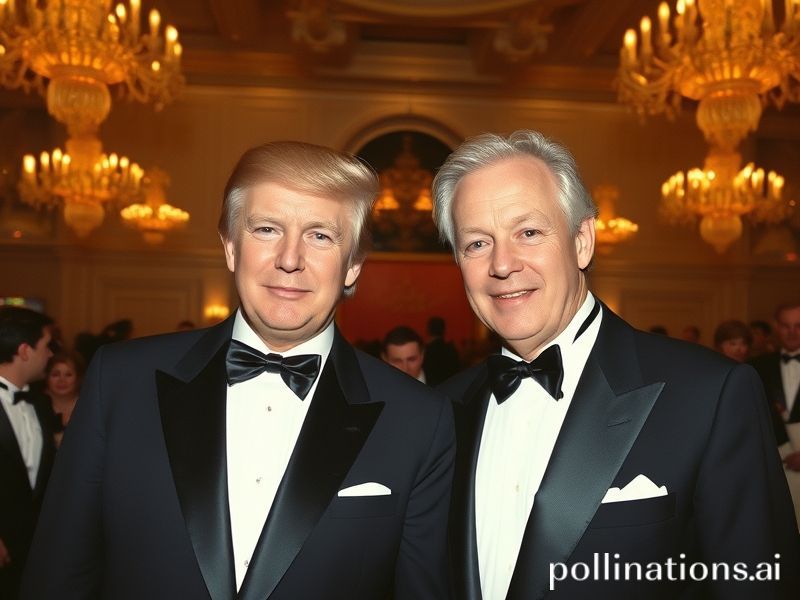Global Rubbernecking: How the Trump-Epstein Files Became the World’s Favorite Spectator Sport
From Bangkok boardrooms to Berlin biergartens, the phrase “Trump-Epstein” has become a sort of global Rorschach test: everyone sees the same inkblot yet claims the other side is hallucinating. For some, it’s a smoking gun wrapped in a subpoena; for others, a convenient deflection from their own preferred swamp monster. Either way, the world is once again rubber-necking at America’s political car crash while quietly checking its own rear-view mirror for bodies.
Start with the optics. In the United States, the renewed chatter stems from the latest tranche of unsealed Epstein court documents—those grim holiday calendars no one asked for. The files mention Donald Trump in the same breath as “massage” and “nightclub,” words that, in any other context, would merely suggest a midlife crisis in progress. Cue cable-news sirens, fundraising emails, and the ritual sacrifice of nuance on the altar of engagement metrics.
Overseas, reactions range from Gallic shrugs to Chinese schadenfreude. Parisian editorialists note—with the satisfaction of a people who guillotined their own aristocrats—that American scandals remain refreshingly democratic: any billionaire can play. Meanwhile, Beijing’s state media frames the saga as evidence that “capitalist rot” starts at the penthouse and drips down, preferably onto a subpoena server’s shoes. The irony, of course, is that both societies have hosted their own Epsteins; they just lacked the courtesy to leave a paper trail for Netflix to option.
Zoom out and the Trump-Epstein subplot becomes a geopolitical inkblot too. For EU regulators already drafting stricter anti-money-laundering rules, the case is Exhibit A in the argument that private jets are just sky-borne safety-deposit boxes. Gulf sovereign-wealth funds—which once queued to license Trump trademarks—now commission risk reports asking whether proximity to scandal is a new form of carbon emission. Even in Davos, where moral compasses are recalibrated hourly, panels on “reputational contagion” have replaced panels on “blockchain for good,” a downgrade even the most soulless consultant finds depressing.
The developing world watches with darker amusement. In Nigeria, Twitter wags quip that Epstein’s island would be considered “infrastructure” if only it had a toll road. Argentine columnists remind readers that their own elites traffic in slightly more terrestrial vices—football clubs, not private islands—yet somehow still end up in Swiss bunkers. From Lagos to Lima, the takeaway is uniform: if the global north can’t police its billionaires, the south will be expected to keep swallowing structural-adjustment pills prescribed by the same consulting firms that polished Epstein’s image for decades.
Financial markets, those finely tuned hysteria machines, have already priced in a “scandal volatility premium.” Luxury real-estate brokers in Dubai report a spike in ultra-high-net-worth buyers seeking anonymity—apparently nothing says “discretion” like a palm-shaped island with 24-carat gold bidets. Art dealers in Basel whisper that certain blue-chip canvases are changing hands at discounts if they once hung in Epstein-adjacent penthouses; nothing kills provenance like a federal investigation. Even crypto bros, who normally treat moral ambiguity as a design feature, are launching “reputation tokens” that promise to scrub one’s Google results faster than you can say “decentralized redemption arc.”
And yet, amid the global tut-tutting, a stubborn fact remains: every nation exports its Jeffrey Epsteins and imports someone else’s. The British have Prince Andrew’s foot-in-mouth disease; the French have their own fashion-world disappearances; the Australians have a mining magnate or two who prefer submarines to sex islands but generate similar levels of inconvenient paperwork. In a perverse way, the Trump-Epstein nexus is a testament to globalization: if capital can move untaxed across borders, why not the predators who traffic in it?
So where does that leave us, dear reader, as we scroll beneath fluorescent office lights or on a rattling commuter train? Precisely where humanity always ends up—somewhere between voyeurism and culpability, clutching our smartphones like rosary beads. The documents will keep dripping, the pundits will keep monetizing, and somewhere a new Epstein is already pricing out islands. The planet spins, the headlines recycle, and the only truly bipartisan position is the hope that next time, the scandal lands in somebody else’s jurisdiction.







